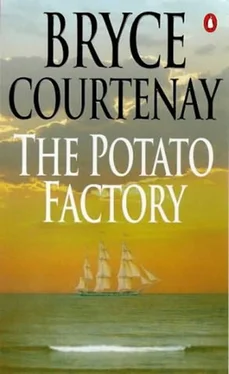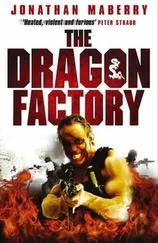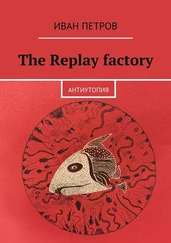Several hours past midnight, long after the customers had been gratified, satisfied, slumbered, sobered and finally put into carriages and sent on their way, when the clicking of Mary's abacus beads ceased and the accounting books were made up in straight lines and neatly squared columns, Ikey would arrive.
He would come in from his vile night abroad where he received and paid and argued and bartered for stolen property in dimly lit taverns and tap rooms, brothels, flash-houses, netherkens and thieves' kitchens and it was usual for him to drop into the Pig 'n Spit where he passed some time at the ratting. His life was populated by all manner of villains, thieves, swell mobsmen, flash-men, touts, pickpockets, pimps, itinerant criminals and scallywags. His last call before returning to Egyptian Mary's was always within the great St Giles rookery, known in the vernacular as the 'Holy Land', to a decaying building long vacated by its original occupants. Here he unlocked the door and in darkness crept up a set of rickety stairs to the very top where the damp and decay had not yet fully penetrated.
Within this building resided a gang of carefully chosen urchins, street children who had been trained to Ikey's ways and who did his bidding. The youngest of them were stock buzzers or smatter haulers, stealers of silk handkerchiefs known as kingsmen which, as was the fashion with toffs, were conveniently carried protruding from the coat tail. Ikey would pay ninepence each for these, though some were worth as much as three shillings when later sold in Rosemary Lane.
Ikey was always on the look-out for a talent, a boy with fingers light enough to make a tooler. A tooler was the most elite of the pickpockets, a planner and plotter, a boy with brains, daring and courage. At any one time Ikey hoped for four toolers in the making and two fully blown and working at the top of their trade. A great tooler could go on to be a swell mobsman, though most, even some of the best, got their hands to shaking from too frequent imbibement of gin or brandy or found their minds preoccupied and numbed to action by the fear of being caught and transported.
Tooling was where the real money lay in the art of pickpocketing and it required four boys, the tooler himself, a stickman and two stalls and, if available, up to four urchins to transport the goods from the scene of the crime as quickly as possible.
The first stall would go ahead, scanning the crowd for members of the law or even a group of workmen or a large shop boy who might give chase to a thief in return for the prospect of a reward. The second stall was on duty between the tooler and the stickman and was generally a larger boy who was required to impede the progress of any person in too hot pursuit of the stickman, who was the first to receive the article from the tooler and get the transportation of the lifted goods under way. The tactics followed were to set a pattern, a routine worked by Ikey until it became second nature to the boys.
Choosing a victim was a task not taken lightly, for the tooler was trained to observe human nature in the smallest detail, to watch the mannerisms of a chosen quarry, how each talked and walked and where they placed their hands, with whom they conversed and where they stopped. Ikey would demand patience and careful selection. A pogue taken from a dizzy shop-girl containing one silver shilling carried the same penalty at law as a dumby lifted from a rich toff stuffed with Bank of England longtails and jingling with gold sovereigns. A garnet brooch deftly unclipped from the bombasine blouse worn by a nanny earned a gaol term or transportion no different to the neatest unclipping of a diamond pin from the silk bodice of a duchess.
'It's quality we's after, lads. To be sent abroad for the lifting of a tin brooch is a sin of character what can't never be recovered from. A gentleman's gold 'unter or a diamond pin, now that's a lay worthy o' true respect!' Ikey would pause, taking in the eager faces around him. 'We does not sell ourselves cheaply, my dears. Tooling is a most ancient and noble art and we are artists. Our fingers play as lightly upon a purse or dumby, diamond clip or gold yack as the fingers o' the greatest virtuoso alight upon the ivories of a harpsichord at a concert in 'onour of the King 'imself.'
Sometimes a promising quarry would be watched for days until the tooler knew precisely how and where to make the pull. A lady might be taken while shopping in the afternoon, this being regarded as light-fingered practice for the more meaningful tooling of toffs and gentlemen during the evening to come. '
'Umans is all predictable, observe the pattern and you know the mark,' Ikey would repeat ad nauseam to his dirty-faced pupils.
Ikey seemed never to tire of the training of these small boys. He started with them very young, not older than six or seven, for it was his belief that the lad who had not mastered the grammar of his art by the time his voice broke seldom reached any high degree of competence. He even taught them to cheat skilfully at the game of cribbage, for he understood that they would naturally grow up to be gamblers and he hoped to give his boys a better chance than most of keeping their ill-gained money in their own pockets.
In this respect and in many others he was known as the best and most famous of all the kidsmen and his toolers became the elite on the streets and in the busy arcades. Urchins would implore him to be enrolled in what Ikey referred to as the 'Methodist Academy of Light Fingers', a spoof on the Methodist Academy of Light, a Salvationist school for the honest poor, situated in an adjacent slum court in St Giles.
While there were a great many kidsmen to be found, men who trained street urchins for snakesmen, pickpockets and as beggars, they were generally most harsh in their methods, ignorant men with a too frequent hard, flat, impatient hand to the side of an urchin's head. Should a boy fail to exhibit the required amount of tact and ingenuity in dipping it was the custom for him to be given a severe beating from the other boys or by the kidsman himself. To this punishment was added no food to eat until the hapless child improved his pick-pocketing technique or simply starved to death.
Ikey, however, offered not harsh punishment but reward, a bright penny handed over, a large chop rimmed with fat added to a child's plate at supper, or even a glass of best beer given with a pat on the back. Ikey's thorough ways and his understanding of the competitive nature of small boys created the best toolers to be found in London, all most proud to be graduates of the Methodist Academy of Light Fingers, Proprietor, Isaac Solomon, Esq.
At practice Ikey would use a tailor's dummy set up in a pool of lamplight and dressed up with the garments most likely to be worn in the street. Sometimes these would emulate the attire of a toff, swell or country gentleman and at others, a grand lady, a doxy or, for the smallest of the children, a nanny or shop assistant. Into these clothes were sewn tiny bells that tinkled at the slightest vibration.
At the conclusion of each week it was the custom among Ikey's boys to take a vote decided by the acclamation of all. The most proficient boy at the practice of dipping was voted the title of Capt'n Bells, whereas the least competent was christened Tinkle Bell. The former was a title much prized among his young apprentice thieves, while the latter was worn with a fierce resolve to be 'unchristened' as speedily as possible.
Bob Marley had come from among these children and there were a number of talented magsmen, swell mobsmen and flash-men who could claim 'a proper education' by the redoubtable Ikey in the ways of thieving and disposing and the general nature of surviving in the trade of taking what rightfully belonged to others. It was this foundation, laid early and trained carefully, which later supplied much of the goods which Ikey would receive as a fence.
Читать дальше












